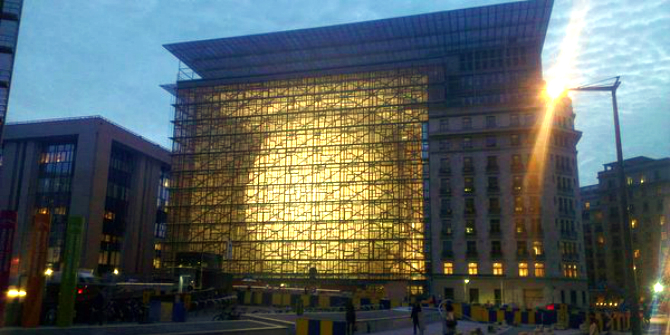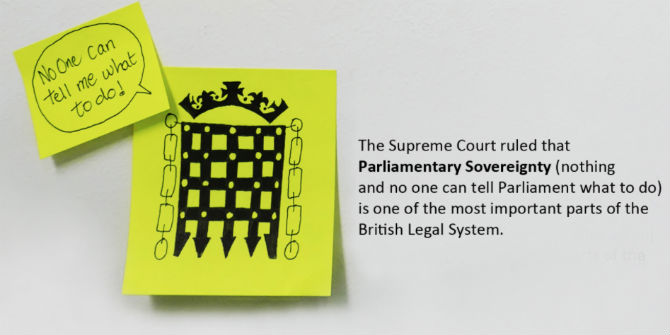 The big Brexit picture is that the UK continues to stumble towards a future association agreement with the EU. Until Article 50 is triggered there will be no official recognition by the EU of this scenario, and the Westminster parliament has yet to get its head(s) around the concept. But experts are reading the runes, writes Andrew Duff.
The big Brexit picture is that the UK continues to stumble towards a future association agreement with the EU. Until Article 50 is triggered there will be no official recognition by the EU of this scenario, and the Westminster parliament has yet to get its head(s) around the concept. But experts are reading the runes, writes Andrew Duff.
The key to all this is that Theresa May learns to accept the EU’s institutional framework for Britain’s future relationship. In particular, Brexit means escaping the direct jurisdiction of the European Court of Justice, but there can be no effective ‘new partnership’ unless the UK respects the jurisprudence of the Court in jointly regulated matters.
Parliamentary scrutiny
The House of Lords continues to trundle out lengthy reports on different aspects of Brexit. Its 14th report deals with the movement of people. It concludes that nobody has any clear idea of how many EU citizens live in the UK, or why they do so. ‘Taking back control’, it seems, will leave Britain’s borders as porous as ever: what really determines the volume of migration is the state of the economy and the value of the pound. And those innumerable Brits who live elsewhere in Europe will be less affected by the Article 50 negotiations than by future bilateral arrangements.
The Lords’ 15th report looks at money. Rather laboriously, it avoids making an estimate of Britain’s exit fee. The committee’s legal advisor argues that the EU is an entity and not a partnership. This misled peers into speculation that there are therefore no EU assets and liabilities to be shared out, and that the UK can leave without paying a Brexit fee at all.
Au contraire, the British would do well to learn that the EU they have chosen to leave is not only a legal entity but also a democratic polity and a moral community. The UK is signed up to a medium-term budget that lasts until the end of 2020, with some contracts on spending programmes extending to the mid-20s. Final accounts will not close for some years after that. At the start of the Article 50 talks, Michel Barnier will politely remind the UK of these financial commitments and only political idiocy by British ministers will prevent an eventual compromise being reached.
European Council building, by Joseph Moran, licensed under Public Domain Mark 1.0
‘Dear Donald, …’
Meanwhile, the Brexit Bill moves back from the Lords to the Commons, with two amendments attached. The first would make a priority of the plight of EU citizens living in Britain – a thing which, with money, features at the top of everybody’s list in any case. The second amendment calls for ‘meaningful’ parliamentary votes at the end of the Article 50 negotiations. Remember that MPs already have the constitutional right, by simple majority, to obstruct any international treaty, including this one. But the Lords want something more.
The prime minister, they say, may not conclude the withdrawal agreement without the approval of both Houses obtained before the European Parliament votes on it. Moreover, the prior approval of the Westminster parliament shall be required on an agreement on the future relationship between the UK and the EU 27, and also “in relation to any decision … to leave the EU without an agreement as to the applicable terms”. The government is resisting this amendment mainly on the grounds, first, that (as Article 50 reads) if a draft agreement is quashed at Westminster, the EU will simply walk away from the UK; and, second, that if the Article 50 negotiations break down, the Commons has no power to force the government back to the Brussels talks with a new mandate.
The government believes that the UK has only one chance of a successful negotiation with the EU, and it knows that the Remainers cannot agree amongst themselves on an alternative prospectus for Brexit. Mrs May’s Article 50 letter is ready to go. All will be revealed once the parliamentary ‘ping-pong’ is over in the next few days.
But as always where the future of Europe is concerned, it’s a case of ‘be careful what you wish for’.
This post represents the views of the author and not those of the Brexit blog, nor the LSE. A version of this blog first appeared on Andrew Duff – On Governing Europe.
Andrew Duff is Visiting Fellow at the European Policy Centre. He was a Liberal MEP 1999-2014.







